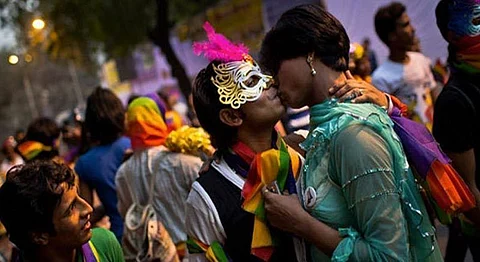
- HOMEGROWN WORLD
- #HGCREATORS
- #HGEXPLORE
- #HGVOICES
- #HGSHOP
- CAREERS
- ABOUT US
- CONTACT US

For the LGBTQ+ community in India, life is a dichotomy, where their expression of love becomes a criminal offense. The draconian law that validates this is section 377 of the Indian Penal Code, according to which sexual acts “against the order of nature” which includes homosexual intercourse, is an offence liable to imprisonment.
The law which dates back to more than a century ago has seen long many twists and turns in its journey in the country. According to this report by The Indian Express back in 2009 in a progressive move, the Delhi High Court struck down Section 377 of the IPC, holding that it violated the fundamental rights of life and liberty and the right to equality as guaranteed in the Constitution. However, in 2012 the Supreme Court concluded that section 377 did “not suffer from the vice of unconstitutionality” and reversed the verdict of the Delhi Court. Since then the LQBTQ+ community has year after year appealed and protested against the gross injustice that this law entails on their expression of freedom.
However it was only in last August when the Supreme Court, in a landmark verdict, declared right to privacy a fundamental right, it also ushered hope for LGBTQ+ community to rid themselves from the injustices of section 377. How? According to this report by The Times Of India, the apex court has concluded that privacy included at its core the preservation of personal intimacies and that sexual orientation. So after the SC’s privacy judgment in August, activists and lawyers working for LGBTQ+ community made a strong case for the rights of sexual minorities.
As a consequence, according to the same report by The Times Of India, the Supreme Court Of India has agreed to reconsider its 2013 decision on section 377 that criminalises gay sexual relations. The SC has also issued a notice to the Centre seeking its response to a writ petition filed by five members of the lesbian, gay, bisexual, transgender and queer community, who said they live in fear of police because of their natural sexual orientation and preferences.
However, hours after the Supreme Court’s decision, BJP MP Subramanian Swamy defended the IPC section and said it cannot go. “In their privacy what they do, nobody can invade but if you flaunt it (sexuality), it has to be punished and therefore there has to be Section 377 of the IPC,” was quoted by news agency ANI. He further added that “as long as they don’t celebrate it, don’t flaunt it, don’t create gay bars to select partners, it is not a problem.”
We can only hope that the re-evaluation of section 377 by the SC will prove fruitful and give the LGBTQ+ community the dignity and equality they deserve. Maybe it will even be the beginning of a much-needed change in mindsets across the country.
If you enjoyed reading this article we suggest you read:
